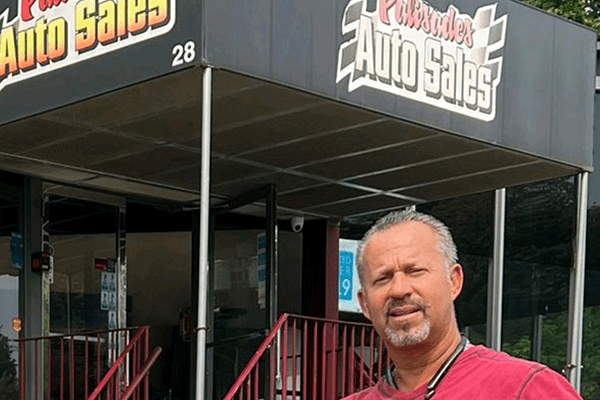|
RCBJ-Audible (Listen For Free)
|
Seth Marks Reveals How Misguided Youth & Incarceration Helped Him Turn His Life Around
By Tina Traster
His father was a travelling textile salesman – gregarious, extroverted, energetic — but life with a suitcase full of wares and time on the road was grueling and often financially insecure. His mother was a stay-at-home mom for many years until she became a nurse in private practices.
Seth Marks was shaped by both parents during his 1970s upbringing in Spring Valley. A challenged and misunderstood student, he glommed onto the art of selling in his early teens. Marijuana dealing was lucrative, the skill came naturally. He excelled at it; the money was an elixir. It led to cars and girls, and a false sense of invincibility.
In 1997, the then 27-year-old married man with two infants, found himself serving six months in prison for dealing an illegal substance. He spent five years on probation and had to forfeit material possessions, including prized cars, as part of a plea deal with prosecutors.
When Marks re-entered civilian life, he fired up his innate selling skills, embarking on a long and successful career trading new and used cars. In 2011, he bought a glass building on Route 59 in the Village of Nyack, where he opened Palisades Auto Sales.
For more than two decades, Marks has focused on building a legitimate career. He has navigated regret over poor youthful decisions, the travails of divorce, and anger and sorrow over the untimely death in 2019 of his daughter Jayde Taylor Marks, who was killed by a drunk driver. Perhaps the healing influences his mother brought to his life have served him as he seeks daily gratitude, forbearance, and now embarks on a venture to open a cannabis retail dispensary in the Mid-Hudson Region, preferably in Nyack.
Marks is one of two successful Rockland County applicants to score a retail cannabis dispensary license from New York State’s Office of Cannabis Management. The dispensaries must be owned by equity-entrepreneurs with a prior cannabis-related criminal offense, also referred to as “justice-involved individuals,” who also have a background owning and operating a small business.
“There’s something so ironic about this,” said Marks. “It brings back a lot. My history, being arrested. Incarcerated. How life changed. Struggling through marriage and divorce. Raising four children. Remarrying. It’s just a full circle thing: both an opportunity for a lucrative business but also a chance to give back, to give people work, to help those who are less fortunate.”
The state’s office of Cannabis Management to date has approved up to 300 CAURD licensees. CAURD is an acronym for conditional adult-use recreational dispensary.
Marks, who long ago left behind cannabis use, had not been plugged into New York’s long and arduous path toward cannabis legalization. The Marijuana Regulation and Taxation Act was signed into law by former Gov. Andrew Cuomo in March 2021. He was deep in the car world, adjusting in recent years to challenges posed by the pandemic, including supply-chain shortages and now rising interest rates. But a couple of chance encounters with Rockland folks who’ve put a toe into what is expected to be a burgeoning industry brought to his attention an opportunity for successful entrepreneurs who had state-level marijuana felonies in the past.
Applicants for the dispensary licenses also are required to have strong ties to New York, such as a primary residence or bank accounts. The licensing effort was designed to give priority to people in communities that were heavily targeted during the war on drugs.
Marks had been on the cusp of leaving illegal dealing behind when undercover narcotics agents in Rockland caught up with him. He says he was snagged by a former client wearing a wiretap. Now an adult, Marks looks back, somewhat sadly, on a childhood laced with financial insecurity.
“There was never a tremendous amount of financial security,” he recalled. “That was a fact. It shapes childhood. I knew other people who came from money. It wasn’t what I saw at home. It set up a fallacy that I was less.” Addled with self-doubt and insecurity, Marks, who eked his way through high school, turned to drugs to self-medicate.
“I was uncomfortable living in my skin,” he said. “I was not a successful member of society.” Until he started selling, first to friends and to his inner circle. Then his “business” flourished, and he was reeling in more money than he could have imagined. He bought a Harley Davidson. He bought rounds of drinks. But he said he was also saving money because he always knew he wanted to do something entrepreneurial, something above board. Before his prison stint, Marks sold cars. After his incarceration, he returned to the trade, and it proved fruitful.
Lawsuit Lifts Injunction; Preparing Way For HV Licensees
Prospective Hudson Valley licensees had been waylaid for nearly six months while the courts grappled with a lawsuit filed by Variscite NY One, Inc. of Michigan. The out-of-state plaintiff claimed his company, which sought a license, was discriminated against based on a system of preferences favoring in-state applicants.
In April, a federal appeals court lifted part of an injunction that prevented cannabis regulators from issuing licenses for recreational dispensaries in some parts of New York, removing a major obstacle for the state’s rollout. The removal of the injunction led the way for dispensaries to open in some of the state’s most populous areas, including Buffalo, Syracuse and the Hudson Valley, giving farmers and manufacturers — who have been sitting on accumulating inventory — more outlets to ply their weed.
Getting from licensing to opening is a process that can take several months. Licensees are permitted to seek out their own real estate or operate in a “turnkey” location set up by the state Dormitory Authority.
In late 2021, towns across the state had to decide whether or not to opt in or out to allow retail dispensaries and consumption lounges. The Town of Haverstraw is Rockland’s only opt-in town, along with the villages of Nyack, Piermont, Airmont, Spring Valley, Chestnut Ridge, the Village of Haverstraw, and Hillburn. The remainder of the county’s municipalities voted to opt out – which means cannabis retailers will not be permitted in their jurisdictions until or unless they opt back in.
After Nyack opted in, town officials demarcated through the zoning code where retail dispensaries are permitted. This includes the commercial corridor along Route 59, as well as the DMU 1 (downtown mixed use), which includes Main Street and parts of Broadway.
Marks, who lives in Orange County, says his first choice of venue for a retail dispensary is Nyack, but he’s eligible to open anywhere in the Hudson Valley.
“Nyack is my first choice,” said Marks. “My loyalty is to the village. I’ve run a business here. We’ve been successful. We’ve given back. But we’ll see. I’ve learned to be less afraid of the unknown.”















